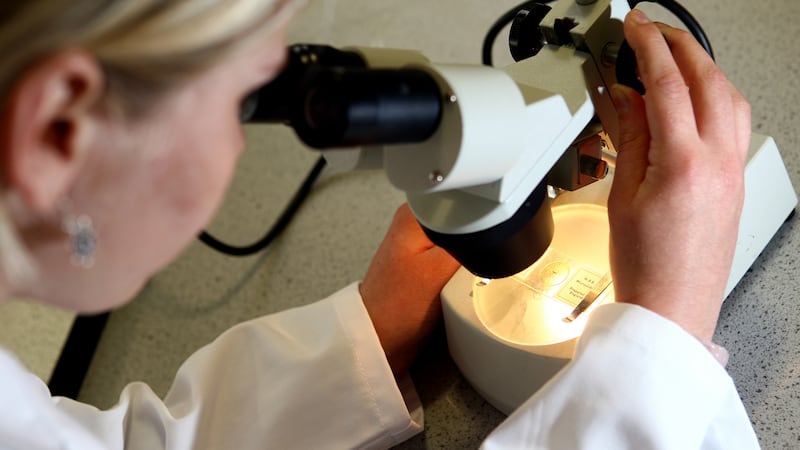There is something very immature in Sinn Féin constantly going on about an Irish language act. They make out that it is about equality and identity, forgetting that feeling equal with my Protestant neighbour does not depend upon a piece of paper stuck in some cupboard up on the Hill. We are equal with our unionist neighbours. Why does Sinn Féin go on pleading and fighting as if we were still trodden down as under the old Stormont?
The nationalist people of Northern Ireland have claimed equality, we live it out on a daily basis, walking down the streets of our towns, in our work and in our play. While Sinn Féin have played politics for years, hard working people in the GAA and CCE have quietly promoted the Irish identity in a peaceful and dignified manner. Using our national language as a political weapon is unbecoming a political party which seeks to lead our country.
On the other hand, the reaction of the DUP to Edwin Poots simply agreeing to implement what was already agreed, reveals the bad faith in which the DUP had negotiated. The raw fury and hatred on display reminds us all of what Northern Ireland would be like if majority rule ever returned. The obvious longing for a
return to the old days of unionist hegemony betray why nationalist people will always vote for Sinn Féin as a counter balance to this ever happening.
A mature Sinn Féin would walk on, quietly promoting Irish culture alongside its political ideas, leaving the babies of unionism to cry in their milk. A self-assured, confident Catholic population wants to go forward, build up our own communities and if others want to join us then all the better.
An arrogant DUP led by Sir Jeffrey Donaldson may well push London too far on the issue of the Protocol and we may find ourselves with more urgent problems facing us than the Irish language act.
John Hume was right. We have to unite the people before we unite
the country.
Do we want to end up with a united Ireland where the unionists find themselves feeling the same as we did for 50 years? We don’t need an Irish language act, we need to act and believe that the language we use is important.
TURLOUGH QUINN
Portglenone, Co Antrim
Precipice politics
Even by Northern Ireland standards the past week has been a political car crash.
The DUP all but imploded, Sinn Féin went to the Westminster Parliament – which it boycotts on ‘principle’ – asking the British government to introduce an Irish language act - and the assembly teetered on the verge of being collapsed. All the while, the living conditions, working conditions and the quality of life of the people of Northern Ireland improved not one iota.
Precipice politics is the hallmark of nationalism and for the past 50 years at least we have had to endure its consequences.
Never is pushing others close to the edge more exciting for all forms of nationalism than when the push is against their mirror image.
Unionism consistently reacts with an alarming predictability to provocation from Sinn Féin’s Irish nationalism. Its default position appears be to reverse up the nearest political cul-de-sac leaving its back against the wall and with nowhere to go.
Sinn Féin, for its part, runs around with a pointed stick prodding every sleeping unionist dog it can find until one awakens and reacts. Last week has been no different. Ironically, Edwin Poots agreed to the secretary of state’s plan to introduce the cultural component of the New Decade, New Approach deal, but once again the DUP juggernaut was predictably thrown into reverse.
And what has it all been for? Tribal precipice politics pushes one side to the edge. Blink first and the other one wins – but everyone else loses.
While the assembly was being pushed nearer to the cliff edge not one single patient came off the waiting list as a result. Not a single new childcare place was funded. Not a single brick was laid for a new house and not an inch of progress was made towards creating a healthier environment.
Sinn Fein’s week was not about the Irish language or any cultural package. That just happened to be the current sleeping dog that they’ve poked. The DUP’s opposition was less to do with a dislike of the Irish language and more to do with the fact that Sinn Féin are campaigning for it.
These forms of toxic nationalism are not part of the solution – they are the problem. A different future is possible, but it can only be achieved through a transformational shift to secular, socialist, anti-sectarian class politics.
PATRICK LYNN
Workers’ Party, South Belfast
Fermanagh has suffered most from partition
Partition was bad for Ireland but it was especially bad for the border communities in Co Fermanagh. Of all the counties I would say that Fermanagh has suffered the most from partition.
If there is ever to be a just peace and stability in the Ireland of the future then Fermanagh must experience inward investment on a large scale.
Invest NI has done nothing for Fermanagh. The Belfast/Good Friday Agreement has made no noticeable improvement in the local economy. Our young people in Fermanagh are highly educated – but most of them are forced to leave after they graduate.
I would appeal to industry and business, especially those involved in technology, to consider investing in Fermanagh by establishing viable industries that will employ our highly qualified young people. Needless to say, these should be ethically based and environmentally friendly.
The young people of Fermanagh of all persuasions need your help to provide good jobs to ensure that they can stay at home and help grow a local economy.
FR JOE McVEIGH
Co Fermanagh
Leadership elections
On BBC Spotlight (June 8), Valerie Quinn of the Ulster Bands Forum spoke of the DUP saying that people will “not vote DUP again”. Of the threat of a Sinn Féin first minister she says “what would be the difference?”
Valerie is right in so many ways. There is, for example, their leadership or deputy leadership contests. Both parties do it in secret. The members who do the slogging and canvassing have no vote or open hustings or choice. Why are the members of these parties so docile or led that they do not demand to have a say? Is there something more going on?
Is it not long overdue that the DUP gives a say to every member to curtail the influence of the Free Presbyterian Church?
Is it not long overdue that Sinn Féin gives a say to every member to counter the influence of the army council?
When will these ‘democratic’ parties be challenged by members and pundits to change before their next leadership contest, whenever that may be?
For how long more will these scandalous anti-democratic failings be ignored?
SEAN MALONE
Warrenpoint, Co Down







